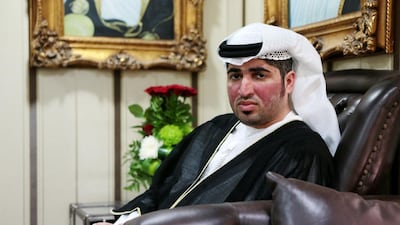The law now allows for sex-change surgery in cases where it is deemed a medical necessity. Those with gender dysphoria are coming forward to seek help from legal, as well as medical experts.
ABU DHABI // A transgender woman who wants to live as a man hopes a new law will allow him to have a sex-change operation.
“Ahmed”, 24, an Emirati, was born a woman but dresses and behaves like a man.
The law, which came into force last month, permits a sex-change operation if a person's gender is unclear or if a medical examination confirms that their physical features do not match their biological, physiological and genetic characteristics.
Ahmed had considered a sex-change operation in Thailand but could not afford it.
“With the new law, the Government will finally recognise me,” he said.
Ahmed said even if he has the operation, problems could remain.
“Will society accept me?” he said. “Will the Government accept me? Will I still be called by my female name?”
Ahmed has felt as if he was male from an early age.
“I feel like this is not my body,” he said.
“I hate it whenever I look in the mirror. I’m not comfortable in it and it just doesn’t feel right. This is not how I want to continue living my life. I am trapped and I need help.
“Ever since I was young I haven’t felt right. I hated wearing girlie clothes.
“At parties and weddings I used to cry because I hated wearing a dress. My mother used to force me to wear them.
“When I saw men, I felt I was the same as them.”
Ali Al Mansoori, a lawyer is representing a 29-year-old Emirati woman who is seeking permission to have a sex-change operation.
He said that despite the new law, changing sex would still not be a simple process.
“You can’t suddenly decide to be male or female and have it done,” he said. “It’s a long process.
“You must have a medical report from the authorised medical committee stating that it is a medical necessity.”
Mr Al Mansoori described the case he was working on as “unique and sensitive”.
Dr Isis Badawi, a senior clinical psychologist at the Canadian Medical Centre, said the new law was “impressive” and a “progressive outlook” for transgender patients.
Being transgender, she said, was not a choice.
“Nobody chooses to be that miserable and rejected by everybody around them,” Dr Badawi said two years ago.
“It is a sad road and in that sense they require support and empathy. I hope more information leads to more empathy. I’m not sure it’s easy for society to accept, not sure it is easy for parents to accept.
“It is a very serious condition and it is quite rare. I do not consider myself an expert in the field but I see many transgender individuals in the UAE.
“For them to come to see me is an indication of the level of unhappiness and alienation they experience.
“It requires courage and a lot of effort on their part.”
salnuwais@thenational.ae

